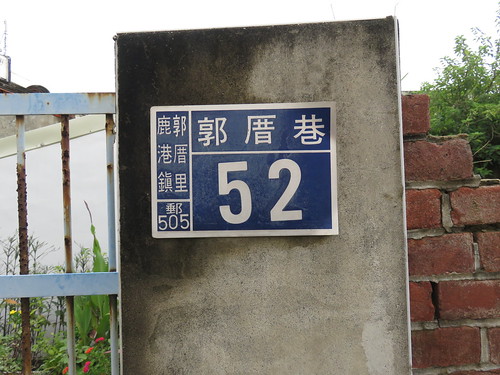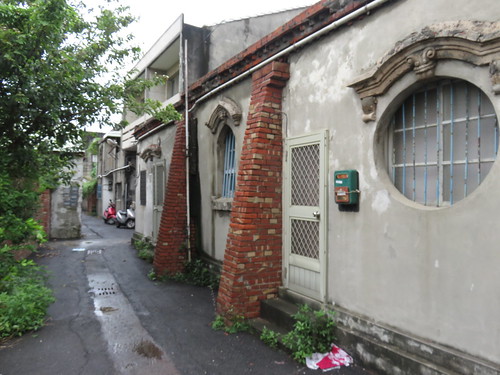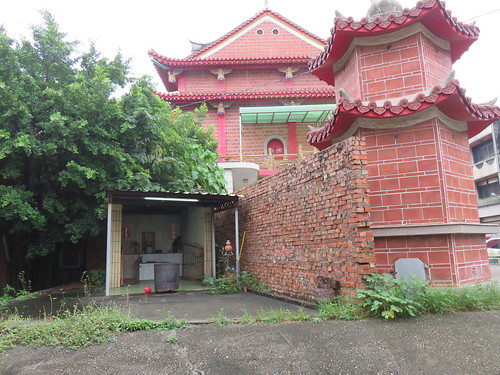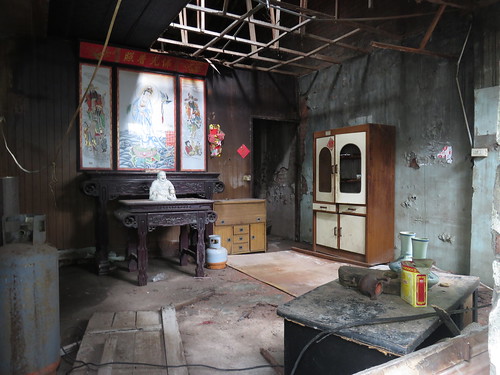Time once again for our regularly irregular feature on a scholarly paper about Taiwan...
While I was looking at the complicated ethnic history of Quanzhou in Fujian, where 45% of the pre-1949 immigrants to Taiwan came from, I ran across this fascinating paper by Oded Abt entitled "Muslim Ancestor, Chinese Hero or Tutelary God:Changing Memories of Muslim Descendants in China,Taiwan and the Philippines"(Asian Journal of Social Science 42 (2014) 747–776). I asked Dr Abt to send the piece to me which he courteously did (if you want a paper just ask a scholar, they always provide). The paper is based on fieldwork he did in China and Taiwan in the 2000-2010 period.
Abt's paper discusses the background of the Guo family of Baiqi in Quanzhou. Early in the Qing these Guos sent a branch across the Strait to settle in the thriving port town of Lukang. In Lukang there are six branches of the Guos -- four branches that are part of one lineage from Baiqi, one branch composed of Guos who are not in the main branches, and a sixth branch composed of people with the Guo surname who are not related to the Guos of Baiqi (they come from Rihu and also trace their ancestry to General Guo) but joined the family based on the common surname (common surnames are useful bases for relationships in Chinese society). The interesting thing was that the Guos began as Muslims...
The Baiqi Guo’s earliest ancestor was Guo Deguang 郭德广 (born between 1308 and 1311), a Muslim trader who moved to Quanzhou from Hangzhou, at the beginning of the 14th century. In 1376, a short while after the Ming rose to power, his grandson Guo Zhongyuan 郭仲远 (1348–1422) moved across the bay and established the family’s permanent home at Baiqi. At present, all Guos in the vicinity are his descendants (BaiqiGuoshiHuizuZongpu vol. 1: 61–62; Chen Dasheng 1984: 102–107). According to genealogical sources, at the beginning of the 17th century, “by the time of the Eighth and Ninth generations [of the Guos in Baiqi] they completely abandoned the [Muslim] faith, apparently in the mid-Wanli reign period (1573–1620)” (Baiqi Guo Shi Huizu Zongpu vol. 1, 2000: 15).5 Beginning in the early Qing period, several Guo households crossed the Taiwan Strait and settled in the town of Lugang 鹿港 where they were joined by other sub-branches throughout the Qing period. Another smaller community was formed in the Philippines by Guo sojourners that settled there throughout the Qing and Republican periods.According to many scholars who write on the Hui (Muslim-descended) people in Chinese society and in Taiwan, Islam has vanished from their lives except for occasional taboos, such as not eating pork before performing religious rituals, that are still retained within families. Abt writes:
The Baiqi Guo lineage has preserved such ancestral-worship customs as the pork taboo, which is meant to demonstrate its Muslim origins. At the same time, the clan has also maintained a tradition that associated it with the wider Han community. The recently restored ancestral hall of the Baiqi village carries inscriptions and couplets alluding to the Guos’ mythic Chinese founder, the Tang general Guo Ziyi. They open with the words “our ancestor is of Fenyang, our branch from Fuyang …” (zu Fenyang, pai Fuyang … 祖汾陽, 派富陽…7), commemorating the clan’s descent from Guo Ziyi, whose official title was Prefect of Fenyang.8 The characters Fenyang 汾陽 are often written as an honorary title referring to Guo Ziyi himself and they appear on many of the lineage’s funerary and ritual articles.Clan members know that Guo is only a mythical ancestor later adopted -- many different families adopted famous ancestors with the same surname during the Ming in order to fit in with the Han society or because it gave gentry a leg up in getting into the civil service. The Guo families know that their connection to General Guo is mythical, but to them the preservation of the link represents a symbol of the persecution these Muslim families faced in China... Abt observes:
In the present, the Baiqi Guo themselves accept this view. Nowadays, when asked about it, members of the old folks committee (laoshehui) and senior residents of Baiqi village explain that the tradition of revering Guo Ziyi is a remnant of the troubled time during the early Ming period, when minority groups such as their ancestors suffered harsh persecution and hostility at the hands of both local Han society and the Ming Government.An interesting old house in Guocuoli
Inspired by this paper, I went down to Lukang (where my wife's family is from, although she is one of the Shih clan) to locate the enclave of Guos, called Guocuoli (郭厝里). Unfortunately nothing of the infrastructure of Islamic practice is left... Abt notes:
The Guo members, like their kin in Baiqi, do not practice Islam at all. Many of them do not retain even the slightest traces of their Muslim ancestral heritage (Pillsbury, 1973: 144–149; Cai Maotang, 1980: 101–105; Su Yiwen, 2002: 29–38; Huang Tianzhu, 1993: 139). They are aware of their Muslim origin, although it maintains only a marginal part in their current religious activities and family traditions. The elders of Guo Cuo Li still recall the purifying well that was located in the heart of their neighbourhood until about 60 years ago, in what used to be the yard of the local mosque.According to Abt the traditions of descent from Guo Ziyi are "very rich and thriving". The community built a new temple to their tutelary deity around 2000 called the Bao An Temple, to replace the one dating from 1725.
A side view of the Bao An Temple, with a small earth god temple in the foreground. Being easily distracted I never did get a picture of the Bao An Temple...
Abt's paper ends with a discussion of the politics of the Hui identity in modern China, where the state identified some groups as Hui (Muslim) in the 1950s, and Taiwan. Identification with this identity has waxed and waned with politics, but state efforts have stimulated responses that have helped reinforce and reshape these identities...
In present-day China, being classified as one of the 56 officially recognised nationalities signifies absorption into the larger collective of the Chinese nation. Among the mainland Baiqi community members, Guo Ziyi is a symbol of forced assimilation and this, in turn, embodies their contemporary Sino-Hui identity. Outside the boundaries of China the boundaries of Chinese-ness are also transformed: In Taiwan, Guo Ziyi is a symbol of identification with a large universal Chinese surname-group. Descent from Guo Ziyi is what enables the Lugang Guos to ascend above the more immediate foreign ancestry and form a link to the core of mainstream Chinese national and cultural heritage.
A ruined house in Guocuoli
Today you can walk around Guocuoli and never know its unique heritage, for there is nothing on the ground to signal that this place has is own special history.
_______________________
[Taiwan] Don't miss the comments below! And check out my blog and its sidebars for events, links to previous posts and picture posts, and scores of links to other Taiwan blogs and forums!




No comments:
Post a Comment